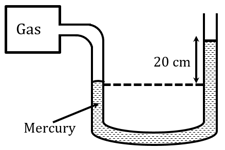Atmospheric Pressure and Gauge Pressure
Atmospheric Pressure and Gauge Pressure: Overview
This Topic covers sub-topics such as Atmospheric Pressure, Gauge Pressure, Mercury Barometer, Absolute Pressure, Hydrostatic Paradox, Measurement of Atmospheric Pressure, Open Tube Manometer and, Variation of Atmospheric Pressure with Height
Important Questions on Atmospheric Pressure and Gauge Pressure
The pressure at the bottom of a tank of water is where is the atmospheric pressure. If the water is drawn out till the level of water is lowered by one-fifth, the pressure at the bottom of the tank will now be
A piston of mass M = 3kg and radius R = 4cm has a hole into which a thin pipe of radius r = 1cm is inserted. The piston can enter a cylinder tightly and without friction, and initially it is at the bottom of the cylinder. 750gm of water is now poured into the pipe so that the piston & pipe are lifted up as shown. Find the height H of water in the cylinder h of water in the pipe
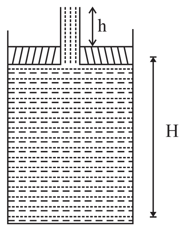
An open U-tube contains mercury. When of water is poured into one of the arms of the tube, then the mercury rise in the other arm from its initial level is
A manometer reads the pressure of a gas in an enclosure as shown in figure. The absolute and gauge pressure of the gas (in of mercury) in the enclosure is
(Take atmospheric pressure = of )
A vessel filled with a liquid of density falls vertically downwards with an acceleration . The gauge pressure at depth below the free surface of liquid is :
The height of the mercury column in a simple barometer is h. As the tube is inclined with the vertical at an angle , the length of the mercury column along the length of the tube will become
A manometer tube contains a liquid of density . When connected to a vessel containing a gas, the liquid level in the other arm of the tube is higher by . When connected to another sample of enclosed gas, the liquid level in the other arm of the manometer tube falls below the liquid level in the first arm. Which of the two samples exerts more pressure and by what amount?
The height of mercury column in a simple barometer is . As the tube is inclined with the vertical at an angle , then length of mercury column along the length of the tube will become
Assuming the density of air to be , find the fall in barometric height of mm of Hg at a height of above sea level. Take density of mercury .
Calculate the barometer reading at a place where atmospheric pressure is . Given that the density of mercury is .
Water of density in a clean aquarium forms a meniscus, as illustrated in the figure. Calculate the difference in height between the centre and the edge of the meniscus. The surface tension of water is .
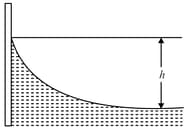
A -tube of uniform cross-section initially contained a liquid of density and had a length of in the tube. Now another liquid (immiscible with the previous liquid) of density is poured in the tube from one end such that this liquid also fills length in the tube. Find the difference in the levels of the liquid on the two sides of the tubery
A mercury barometer has a cylindrical capillary tube of radius inverted vertically on the mercury in the trough. Atmospheric pressure is of mercury but the level of mercury in the capillary is . The portion of the tube without mercury is in length. Considering that this region is occupied by ideal gasses, the number of moles of the ideal gas will be : (Given: Temperature )
Two vertical conducting cylinders and of different cross sections are connected by a thin tube as shown. An ideal gas is trapped in the cylinders by two airtight pistons of masses and respectively. Initially the pistons are at the same height above the base of the cylinders. If an additional mass of were gently placed on the piston in the cylinder , Which of the following statements correctly describe the new steady state ultimately reached.
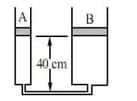
An amount of water is poured on top circular face of a horizontal glass cylinder. Excess amount of water spills over the edges and a little amount of water remains there in a thin uniform layer, a portion of which is shown in the figure. If contact angle is and surface tension of water is , the vertical thickness of the water layer far away the edge is . the point in the plane of the diagram on the liquid where the liquid protrudes the most is . The vertical depth of this point from the horizontal free surface of the water layer is . is density of water and is acceleration due to gravity. Mark the CORRECT relation(s)
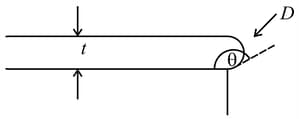
Which instrument is used to measure atmospheric pressure ?
Define atmospheric pressure.
Mention different units of atmospheric pressure?
What is absolute pressure in Pascal?
With the increasing altitude, gauge pressure:

